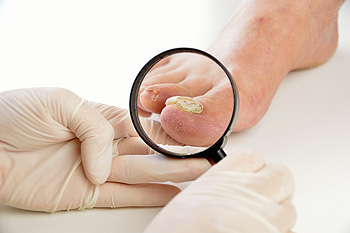What to Do About Your Toenail Infection
Tuesday, 20 July 2021 00:00 Toenail infections are very common and are caused by bacteria and fungi growing on or underneath the toenail. These fungi often thrive and grow in warm and moist environments like public pools, locker rooms and showers. Signs of a fungal nail infection include the nail thickening, turning yellow or brown, becoming crumbly, pain or the nail separating from the nail bed. Patients who notice these symptoms should consult with a podiatrist for treatment options, especially diabetic patients since the infection can lead to further complications. Upon visiting a podiatrist, they will check the nail and suggest a treatment option. Common treatment options include antifungal medications, removing the nail, or antifungal nail paints.
Toenail infections are very common and are caused by bacteria and fungi growing on or underneath the toenail. These fungi often thrive and grow in warm and moist environments like public pools, locker rooms and showers. Signs of a fungal nail infection include the nail thickening, turning yellow or brown, becoming crumbly, pain or the nail separating from the nail bed. Patients who notice these symptoms should consult with a podiatrist for treatment options, especially diabetic patients since the infection can lead to further complications. Upon visiting a podiatrist, they will check the nail and suggest a treatment option. Common treatment options include antifungal medications, removing the nail, or antifungal nail paints.
If left untreated, toenail fungus may spread to other toenails, skin, or even fingernails. If you suspect you have toenail fungus it is important to seek treatment right away. For more information about treatment, contact Dr. Robert Graser of Graser Podiatry and Bunion Surgery Institute. Our doctor can provide the care you need to keep you pain-free and on your feet.
Symptoms
- Warped or oddly shaped nails
- Yellowish nails
- Loose/separated nail
- Buildup of bits and pieces of nail fragments under the nail
- Brittle, broken, thickened nail
Treatment
If self-care strategies and over-the-counter medications does not help your fungus, your podiatrist may give you a prescription drug instead. Even if you find relief from your toenail fungus symptoms, you may experience a repeat infection in the future.
Prevention
In order to prevent getting toenail fungus in the future, you should always make sure to wash your feet with soap and water. After washing, it is important to dry your feet thoroughly especially in between the toes. When trimming your toenails, be sure to trim straight across instead of in a rounded shape. It is crucial not to cover up discolored nails with nail polish because that will prevent your nail from being able to “breathe”.
In some cases, surgical procedure may be needed to remove the toenail fungus. Consult with your podiatrist about the best treatment options for your case of toenail fungus.
If you have any questions, please feel free to contact our office located in Boerne, . We offer the newest diagnostic and treatment technologies for all your foot care needs.
Blog Archives
- July 2024
- June 2024
- May 2024
- April 2024
- March 2024
- February 2024
- January 2024
- December 2023
- November 2023
- October 2023
- September 2023
- August 2023
- July 2023
- June 2023
- May 2023
- April 2023
- March 2023
- February 2023
- January 2023
- December 2022
- November 2022
- October 2022
- September 2022
- August 2022
- July 2022
- June 2022
- May 2022
- April 2022
- March 2022
- February 2022
- January 2022
- December 2021
- November 2021
- October 2021
- September 2021
- August 2021
- July 2021
- June 2021
- May 2021
- April 2021
- March 2021
- February 2021
- January 2021
- December 2020
- November 2020
- October 2020
- September 2020
- August 2020
- July 2020
- June 2020
- May 2020
- April 2020
- March 2020
- February 2020
- January 2020
- December 2019
- November 2019
- October 2019
- September 2019
- August 2019
- July 2019
- June 2019
- May 2019
- April 2019
- March 2019
- February 2019
- January 2019
- December 2018
- November 2018
- October 2018
- September 2018
- August 2018
- July 2018
- June 2018
- May 2018








